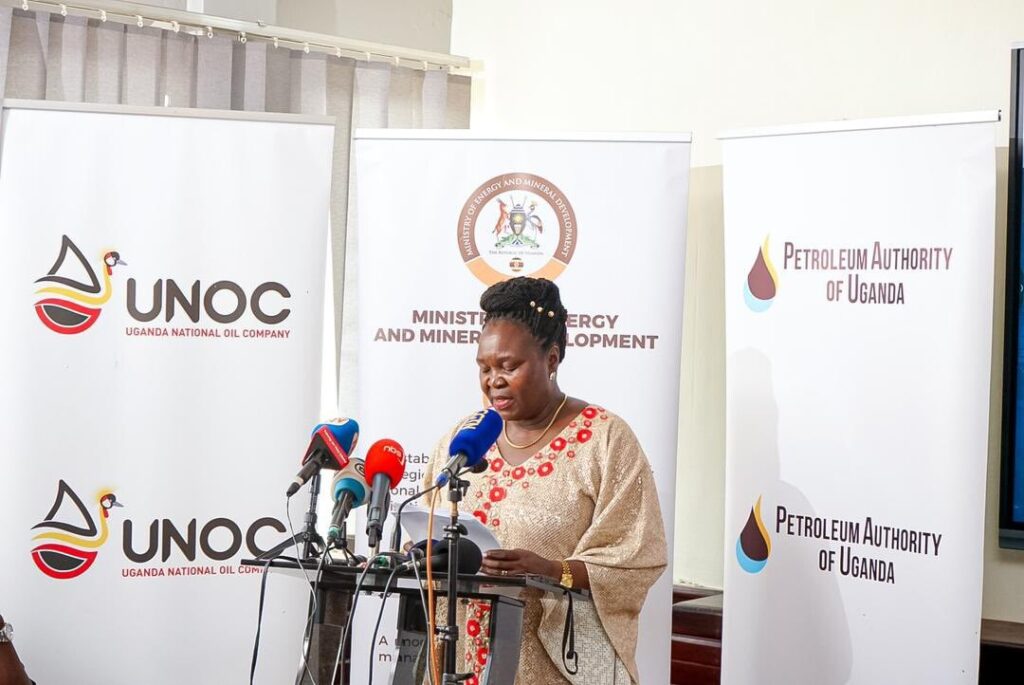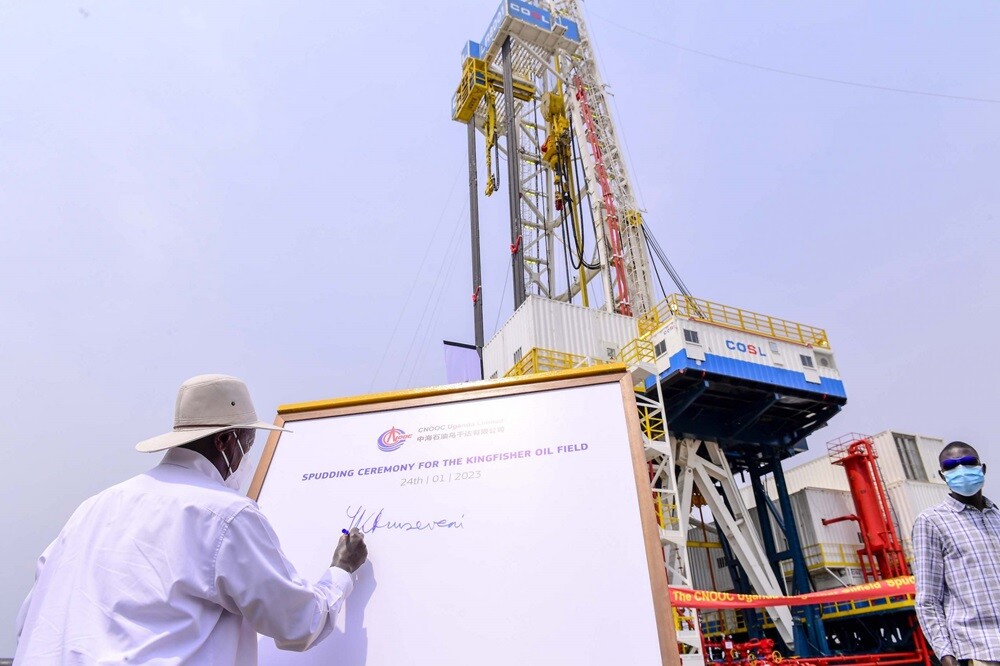Kampala, (UG): Uganda’s Energy Ministry announced on Tuesday, January 23, that it had handpicked United Arab Emirates’ Alpha MBM Investments LLC led by Sheikh Mohammed bin Maktoum bin Juma al Maktoum, a member of the Dubai Royal Family, to finance and construct the proposed 60,000 barrels per day (bpd) oil refinery in Buseruka Sub-county, Hoima District.
In a statement released by Minister Ruth Nankabirwa, the ministry said that “final negotiations” on the $4b (Shs16 trillion) Greenfield project commenced on January 16 after the Emirate firm was selected as the preferred bidder out of five firms that expressed interest.
After private sector partners had been considered for the refinery, Nankabirwa said that on 30 June 2023, President Museveni directed public sector ownership be considered for the refinery.
“The ministry engaged stakeholders to develop a strategy for the refinery project and received Expressions of Interest (EOIs) from potential investors, including Alpha MBM Investments LLC, Africa Economic Aid Limited, Bakertilly Middle East Limited, and St Ignatius Energy,” said Minister Ruth Nankabirwa Ssentamu.
“After thorough consultations and evaluations by the government, a Memorandum of Understanding (MoU) was signed on 22nd December 2023 between the Government of Uganda and Alpha MBM Investments LLC from the United Arab Emirates, outlining cooperation and negotiation terms for the Refinery Project,” the Minister observed.
“Negotiation of the key commercial agreements between the Government and Alpha MBM Investments LLC commenced on 16th January 2024 and is currently underway,” she emphasised.

Government last year cancelled talks with a consortium including U.S. firm Baker Hughes over delays in raising the needed funding for the 60,000 barrel-per-day refinery project.
Alpha MBM is a pioneering investment company and describes Uganda as “an untapped market with the power to create opportunities where none were perceived’’.
Nankabirwa said the construction of the refinery at Hoima in the west of the country “will transform Uganda’s energy security profile as it will no longer rely on neighbouring countries for transhipment of critical fuel supplies.”
Negotiations will last only three months.
The oil sector developments are projected to contribute $8.6 billion to the country’s GDP, and have created over 12,000 jobs, according to the government.
“Transitioning from strategic planning to practical implementation, we are advancing four major oil and gas projects: the Tilenga and Kingfisher projects in the Upstream (US $6-8 Billion) and the East African Crude Oil Pipeline (EACOP) (US $5 Billion), and the Uganda Refinery (US $4 Billion) Projects in the Midstream,” said Nankabirwa.
“These projects, combined with the Government’s investment in supportive infrastructure, signify an investment of approximately US$ 20 Billion in Uganda’s economy,” she added.
With Tilenga and Kingfisher expected to produce respectively 190,000 and 40,000 barrels of crude oil daily at peak production, Ms Nankabirwa also said other exploration licences in the western basin where the two existing projects are based, as well as other basins in the centre and east of the country could lead to higher daily production levels as the country matures as an oil producer.
Infrastructure at the Kingfisher development area, one of the two major production areas already licensed, is well ahead of schedule having reached 21 per cent progress last month rather than the 17 per cent planned.
The Refinery Project
East Africa’s first major refinery is expected to end the region’s reliance on refined products imported expensively from overseas.
As well as driving down costs of petrol, diesel and other fuels, the refinery will also drive a key part of Uganda’s Energy Transition Plan, as it will produce the Liquefied Petroleum Gas that is a key component of the country’s `clean cooking’ initiative.
While Uganda is already a world leader in sourcing electricity from renewables (hydro, solar and geothermal) the burning of biomass such as charcoal and timber for domestic cooking has a high environmental impact.
This environmental damage is dramatically reduced if LPG cookers are used, as well as saving up to 50,000 lives lost through smoke-related respiratory illnesses.
The Ministry of Energy also issued a Licence for the construction of the Kingfisher Development Area Natural Gas conversion facility in Kikuube District, Uganda to CNOOC (U) Limited, today. The licence is for a period of 5 years from the date of issuance in accordance with the Midstream Act.
The refinery is expected to start operating two years after Uganda has achieved first oil in 2025.
Eight years ago, in July 2016, officials of RT Global Resources, the consortium that had been awarded the first refinery tender returned to Moscow to discuss with their superiors about renewal of the performance bond but never returned. RT Global Resources was led by Rostec, a Russian firm that manufactures the AK-47/Kalashnikov rifles.
In his October 8, 2006 address in which he announced that Uganda’s oil deposits were commercially viable, President Museveni stated that it was his government’s intention to have a local refinery. Initially, starting with production capacity of 6,000 barrels per day (bpd) but would later be scaled up to 10,000 bpd—to cater for local demand (10,313 barrels) per day at the time.
Time lines
This, he said, would save the government the annual import bill of about Shs146b ($43m) back then. Oil production, he expected, would start in 2009. The search for an investor for the project also kicked off.
The WikiLeaks diplomatic cables released in 2011 revealed that President Museveni rubbed Washington the wrong way by visiting Tehran and cutting a deal with his counterpart, Mahmoud Ahmadinejad, to have Iran build Uganda’s oil refinery.
After the three-day call in May 2009, the cables detailed, Mr Museveni flew black with yet-to-materialise Iranian promises to fund construction of oil-processing facilities here and train our oil scholars at its University of Petroleum Studies and other institutions.
“We remain concerned about the implications of Iran’s promised investment in the oil sector and for Uganda’s foreign policy decision-making,” Ms Kathleen FitzGibbon, the former Political/Economic chief at the US Mission in Kampala, wrote.
The Uganda-Iran deal suffered a stillbirth.
The President and his technocrats have variously argued that there is a ready market in Uganda for the locally refined petroleum products, and a captive market in Rwanda, East Congo and other neighbouring countries—making Uganda’s refinery viable. According to the Ministry of Energy, Uganda’s fuel/petroleum products imports as of last September averaged at 85 million litres with demand growing at 7 percent per annum.
The planned refinery will produce liquefied petroleum gas (LPG), diesel, petrol, kerosene, jet fuel and heavy fuel oil (HFO).
Viability
Despite these developments, there are lingering questions from oil experts on whether Uganda should actually invest in an oil refinery.
This comes at the backdrop of the recent findings from a report by a UK based think tank, Climate Policy Initiative (CPI), which reveals that Uganda’s oil refinery could be unviable in the long run.
Uganda’s decision to build a refinery has been discouraged on the basis that the facility is not only an expensive venture but also lowers the value of the East African Crude Oil Pipeline (EACOP).
If you would like your article/opinion to be published on Uganda’s most authoritative news platform, send your submission on: [email protected]. You can also follow DailyExpress on WhatsApp and on Twitter (X) for realtime updates.



